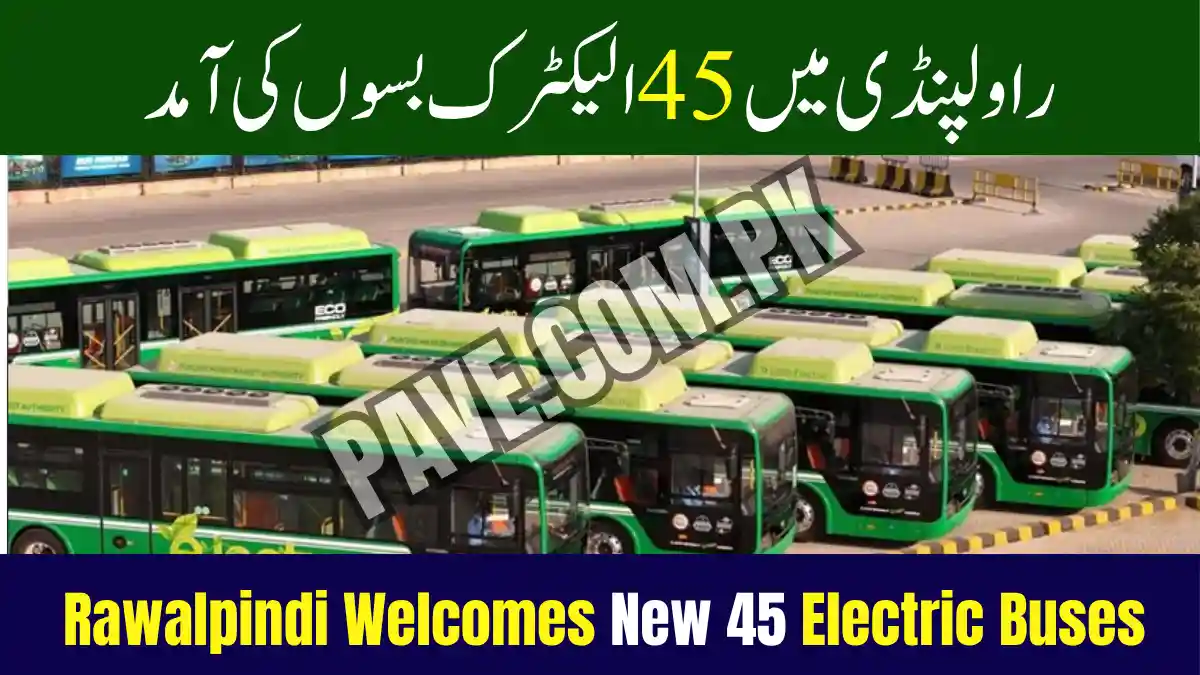Rawalpindi Welcomes New 45 Electric Buses

Rawalpindi has entered a new era of clean and modern public transport as 45 state-of-the-art electric buses have arrived in the city under the Punjab Green Mobility Program 2025. The initiative, spearheaded by Chief Minister Maryam Nawaz, is part of the provincial government’s commitment to promote eco-friendly, affordable, and smart public transportation across Punjab’s major cities.
The service — managed by the Punjab Masstransit Authority (PMA) in collaboration with the Regional Transport Authority (RTA) — is expected to begin operations in November 2025, once final route testing, safety inspections, and charging infrastructure installations are completed.
This milestone marks a significant leap in Rawalpindi’s transport history, setting the stage for a sustainable and electric-powered commuting future for thousands of daily passengers.
Phase One: 45 Electric Buses for Rawalpindi, 15 for Gujar Khan
Under the government’s initial rollout plan, a total of 80 electric buses will be deployed in the Rawalpindi division. Out of these:
- 45 buses have arrived in Rawalpindi city.
- 15 buses have been dispatched to Gujar Khan.
- The remaining fleet is scheduled to arrive in November and December to complete the 80-bus network.
The Punjab Masstransit Authority will oversee the operations within Rawalpindi, while the Punjab Transport Company (PTC) will manage the buses running in Gujar Khan.
This fleet will operate across 10 key urban routes, linking residential areas, markets, hospitals, and educational zones to the Rawalpindi-Islamabad Metro Bus corridor — ensuring seamless, inter-connected travel for commuters.
Charging Stations and Depots Ready for Operation
According to Uzair Shah, General Manager (Operations) at the Punjab Masstransit Authority, the infrastructure for the electric bus network has been fully prepared.
“We have completed the setup of high-capacity charging stations and bus depots. The buses will be on the road by next month,” said Shah.
He confirmed that dedicated charging depots have been established at multiple sites across the city, with the main facility being constructed along Peshawar Road at the old General Bus Service terminal.
Since the depot construction will take several months, a temporary operational base has been set up at Adamjee Road in Saddar, where buses are currently parked and maintained. Some vehicles are also being housed at Metro Bus offices until the permanent site is completed.
Read More: Faisalabad Electric Bus Service October 2025
A Step Toward Green and Affordable Transport
The electric bus system will provide affordable commuting options for the public, with fares ranging between Rs. 20 and Rs. 25 per ride. Officials also confirmed that monthly travel cards and digital payment options will be introduced for students, office workers, and frequent commuters.
Each electric bus is equipped with:
- Air-conditioning and modern seating capacity
- Security cameras and GPS tracking
- Real-time passenger monitoring
- Accessibility features for women and persons with disabilities
“These are not just buses — they represent a new chapter in sustainable urban transport,” said an RTA spokesperson. “They will reduce pollution, save energy, and make Rawalpindi’s public transport system globally competitive.”
Integration with the Metro Bus System
One of the defining features of this initiative is its integration with the Rawalpindi-Islamabad Metro Bus Service. The electric buses will function as feeder routes, extending metro connectivity deep into neighborhoods previously underserved by public transport.
“Our vision is to connect every major city through a single digital transport system,” explained GM Uzair Shah. “All electric buses in Lahore, Multan, and Rawalpindi will operate under the Punjab Masstransit Authority, while the Punjab Transport Company will manage other regions.”
This integration will allow passengers to use a single fare card across buses and the metro, ensuring smooth transfers, minimal waiting time, and cashless convenience.
Chief Minister Maryam Nawaz’s Vision for Clean Transport
Although the inauguration ceremony scheduled for October 15 was postponed due to security concerns in Islamabad, the official launch is now planned for early November.
Chief Minister Maryam Nawaz has prioritized clean energy transport as a central pillar of her Green Punjab 2025 Vision, which emphasizes renewable energy, electric mobility, and inclusive infrastructure.
“Rawalpindi’s electric bus project reflects the government’s dedication to a pollution-free and citizen-friendly Punjab,” said a senior official from the Transport Department. “This initiative will inspire similar eco-friendly transitions in other districts.”
The project also aligns with Pakistan’s National Electric Vehicle Policy (NEVP), which aims to convert 30% of public transport to electric by 2030.
Read More: Breaking News: Punjab to Introduce 1,100+ Electric Buses by Year-End
Bus Stops, Passenger Shelters, and Accessibility Features
The Regional Transport Authority (RTA) has confirmed that modern passenger shelters are being designed to provide shade, seating, and digital route displays.
“Construction of bus stops will begin once operations start,” said Asad Shirazi, Secretary of the RTA. “We’re ensuring comfort, accessibility, and safety for all passengers.”
Each stop will include solar-powered lighting, CCTV coverage, and real-time bus arrival information. These smart shelters will not only enhance user experience but also complement the green and digital transformation of Punjab’s transport sector.
Infrastructure Development: The Heart of the Project
The main bus depot on Peshawar Road will feature:
- A solar-powered charging system to support environmental goals.
- Automated maintenance bays for daily inspections.
- Digital tracking systems for vehicle performance.
Officials confirmed that these buses have been imported from China, featuring advanced lithium-ion batteries with a charging range of 220 kilometers per cycle.
This infrastructure will later be expanded to accommodate over 120 electric buses, forming the backbone of Rawalpindi’s electric transport ecosystem.
Public Reception: Hope and Anticipation
Citizens and environmental activists have widely praised the initiative, calling it a long-overdue modernization of Rawalpindi’s public transport system.
“It’s about time we moved away from noisy diesel buses,” said a university student in Saddar. “These electric buses will bring peace, clean air, and dignity to everyday travel.”
Daily commuters expressed optimism that the project would reduce travel time and fares compared to private van services, which often charge higher rates and lack comfort or safety.
Read More: Punjab Launches 101 Electric Buses in Division October 2025
Economic and Environmental Impact
Experts estimate that the new electric bus system will:
- Reduce urban air pollution by up to 30% within the next two years.
- Cut fuel consumption and carbon emissions by nearly 20,000 tons annually.
- Generate hundreds of new jobs in operations, maintenance, and service management.
This project also contributes to Punjab’s long-term clean energy targets, helping Pakistan meet its COP-28 sustainability commitments.
“Transitioning to electric public transport isn’t just about the environment,” said transport economist Dr. Hamid Raza. “It’s about public health, local employment, and smarter energy economics.”
Future Expansion: More Cities, More Routes
The Punjab government has already outlined expansion plans under the Punjab Electric Bus Program 2025–2026, which aims to introduce 300 electric buses across Lahore, Multan, Faisalabad, Gujranwala, and Bahawalpur.
Rawalpindi will remain the pilot model for other districts — showcasing how clean technology, efficient planning, and public accessibility can transform the urban commuting landscape.
Officials are also exploring local manufacturing partnerships to assemble electric buses domestically by 2027, reducing import dependency and creating sustainable employment opportunities.
Conclusion: Rawalpindi on the Road to a Cleaner Future
The arrival of 45 electric buses marks a historic milestone for Rawalpindi, symbolizing the city’s transition from fuel-based transport to a green, silent, and sustainable mobility system.
With affordable fares, digital integration, and environmental benefits, this initiative is set to redefine urban commuting for millions of citizens.
As the countdown to the November launch begins, Rawalpindi stands ready to become Punjab’s pioneer in electric mobility — proving that progress and sustainability can ride side by side.










